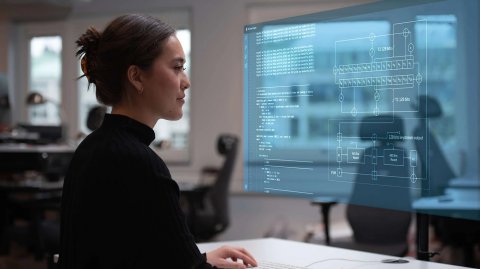The Ericsson IndustryLab report, The Dematerialised Office explores the white-collar employee perspective on a potential future reality where digital technology by 2030 could interact with our senses of sight, sound, taste, smell and touch.

The pandemic as a digital tipping point
Welcome to the future workplace. But what does that workplace look like?
We surveyed over 8,400 white collar workers who are early adopters of AR, VR or virtual assistants from 16 countries, representing around 133 million people, about their expectations of the future workspace. They anticipate:
- A digital workstation that transforms with each task
- A virtual cake from a colleague that you can even taste
- Interactive digital meetings with people rather than being passively stuck behind a screen all day
- But also, future business that takes place digitally, where you can visit virtual stores and warehouses
This year’s pandemic has changed the mindset of many companies and their employees. In our report we present a vision of the internet of senses in the 2030 workplace and explore the challenges and opportunities that this could present.
Key findings
01. Employees want an internet of senses for work
Imagine a fully immersive office experience, where all sensory experiences are digitally interactive. By 2030, the dematerialised office may be a reality. Half of respondents want a digital workstation allowing full-sense presence at work from anywhere. Today, companies direct their funds into maintaining physical office space, but in the future, respondents hope this will be geared towards improving their home office environment.
02. The pandemic has become a digital tipping point
After months of working on their computers at home, constantly engaged in video meetings in their sometimes chaotic home environments, nearly 6 in 10 foresee a permanent increase in online meetings. They are also realising that while connectivity is more important than ever before, digital meetings need to evolve before they become as effective as the real thing.
03. The sustainable dematerialised office
Dematerialisation of the office will be driven by efficiency gains and sales, but the environment is also expected to benefit. With virtual offices, there would be no need to commute, or for companies to keep physical office spaces running. As many as 77 percent indicate that an internet of senses for business use would make companies more sustainable.
04. Virtual interaction with clients and colleagues
50 percent are saying that digital temperature will be used to more immersively engage customers by 2030. Providing immersive full-sense sales environments, such as a virtual shopping mall or warehouse will enable customers to digitally try before they buy.
05. A taste of the future
73 percent of senior managers believe that food in the company canteen can be digitally enhanced to taste like anything by 2030, opening up for optimisation of both cost and perceived quality.
06. Security and privacy are key barriers
As digital interaction moves beyond sound and vision to incorporate all our senses, and potentially also enables functionality such as thought control of devices, the avenues for fraud, manipulation and identity theft will grow exponentially. While 66 percent think that by 2030, technology will enable them to sense when a colleague is upset, that also means their employer will know when they themselves are upset. The challenge will be in finding a balance that allows for fast adoption of digital technology in the workplace, while also respecting the integrity of employees.





